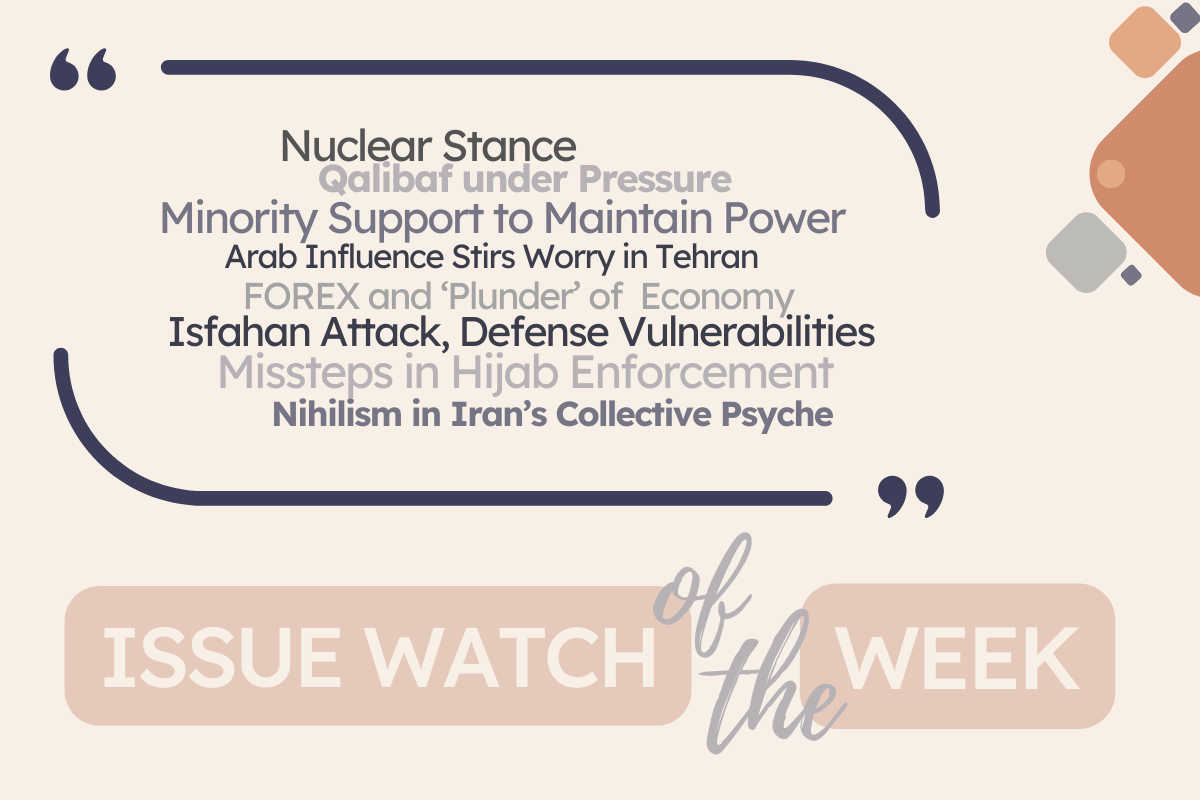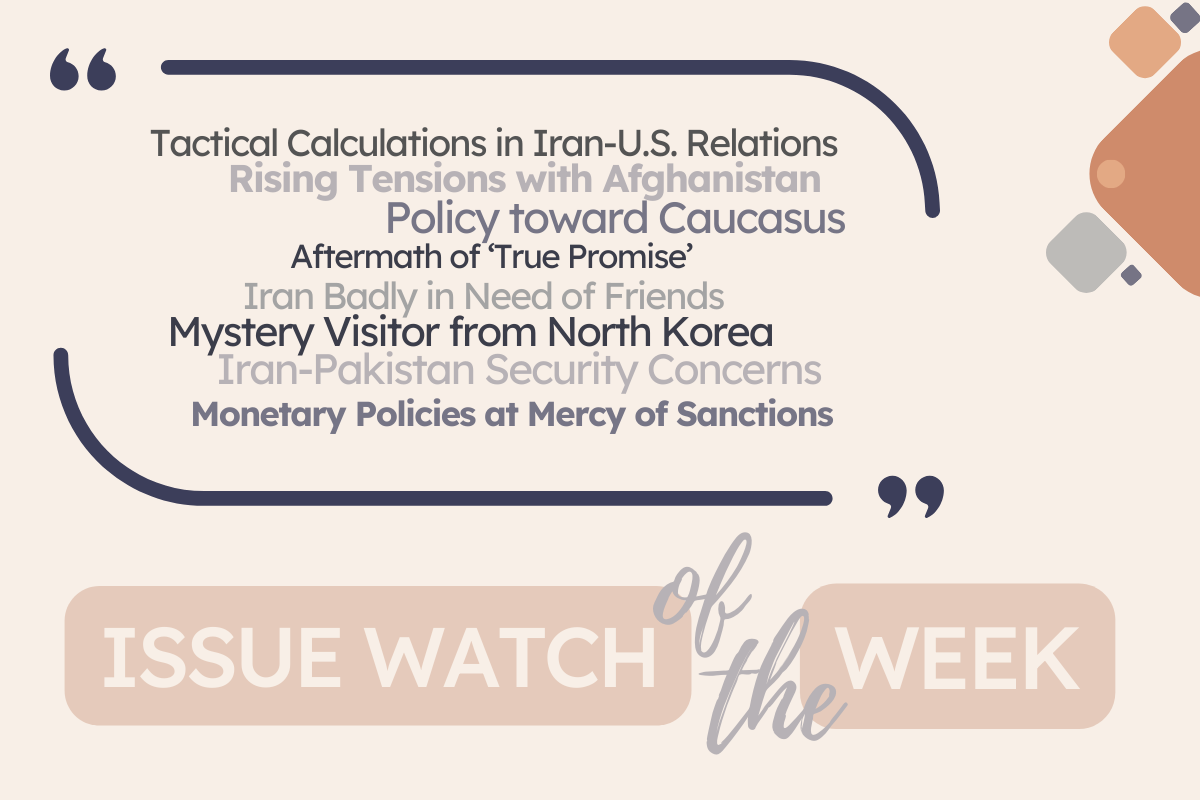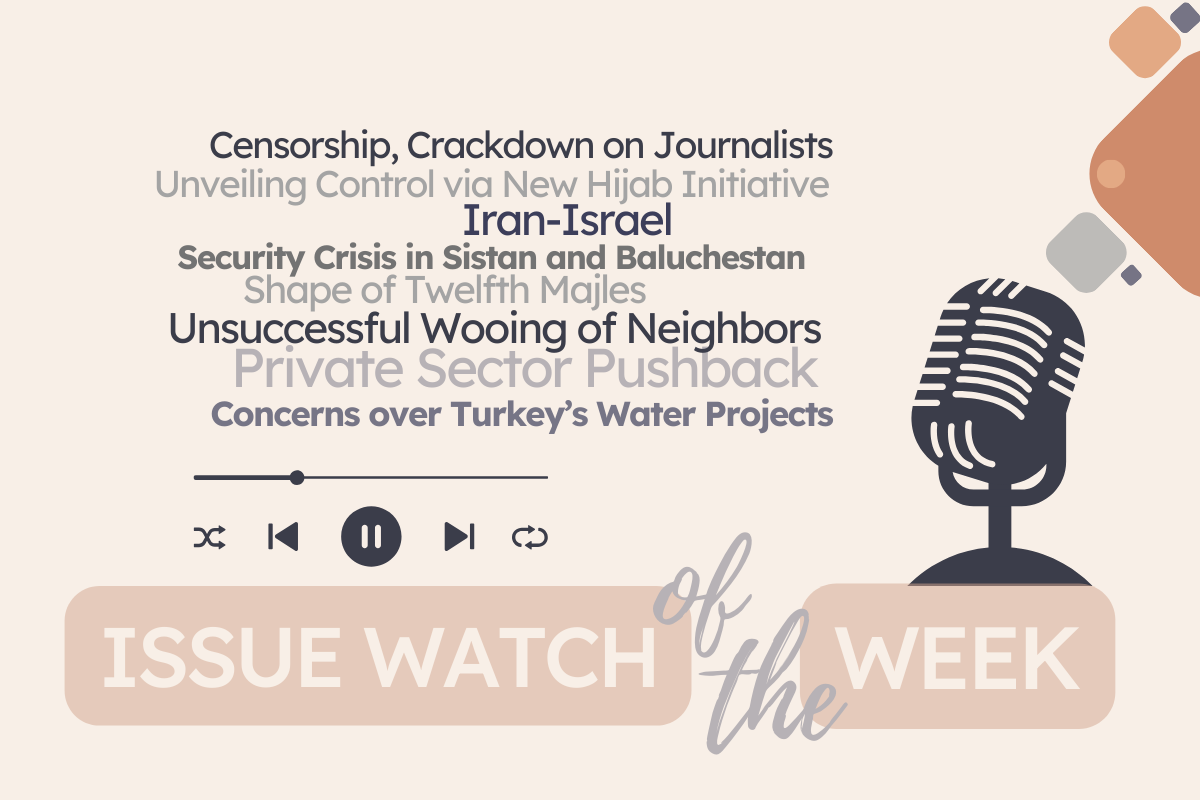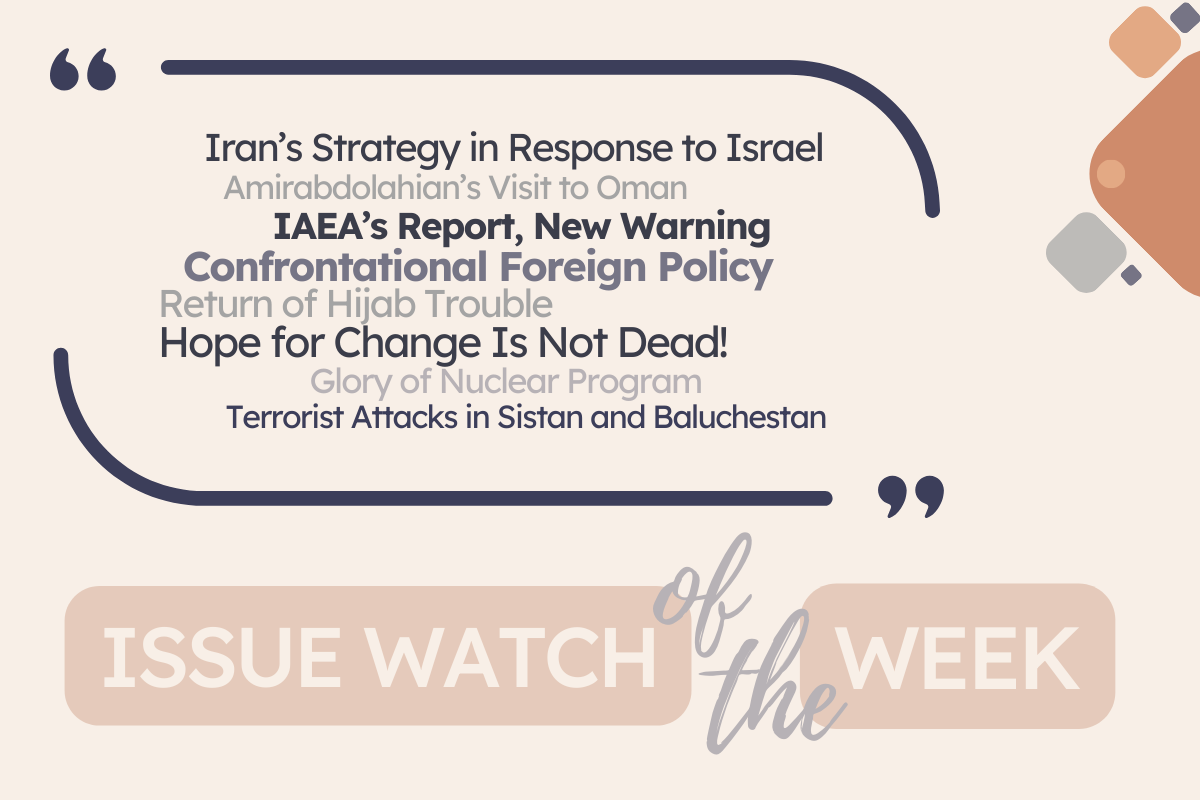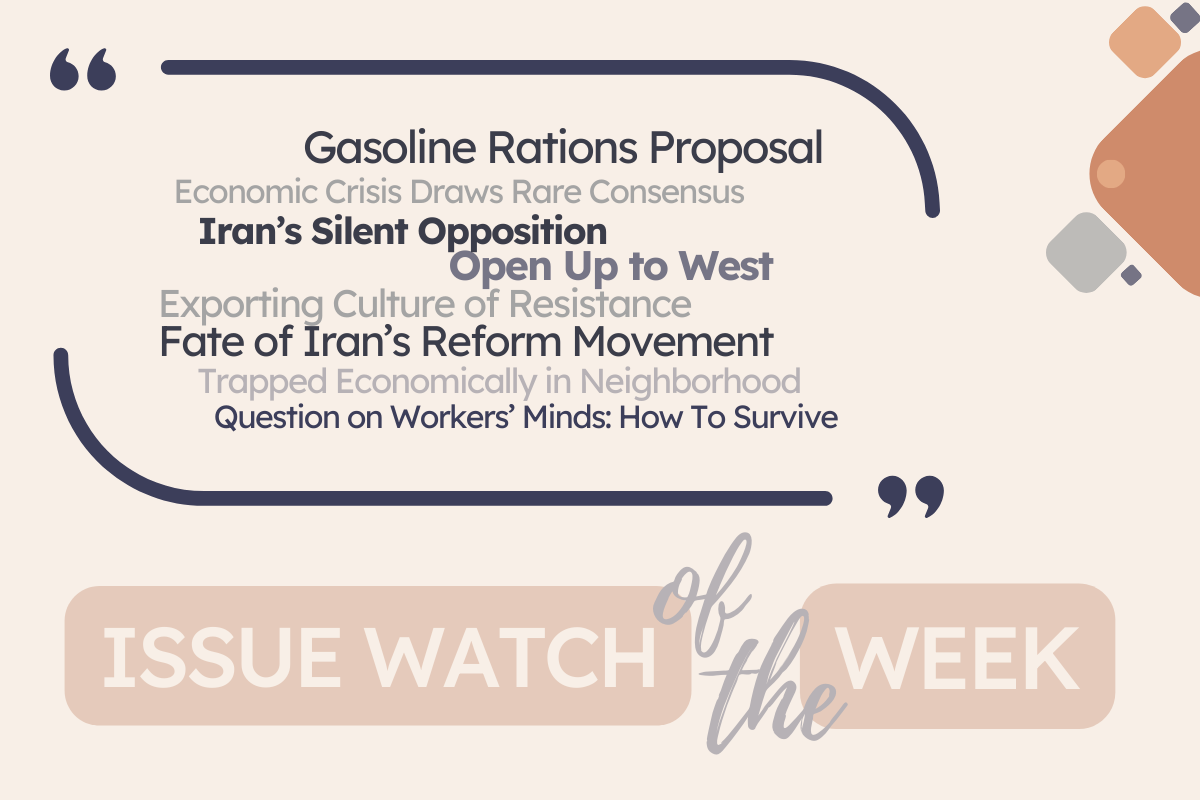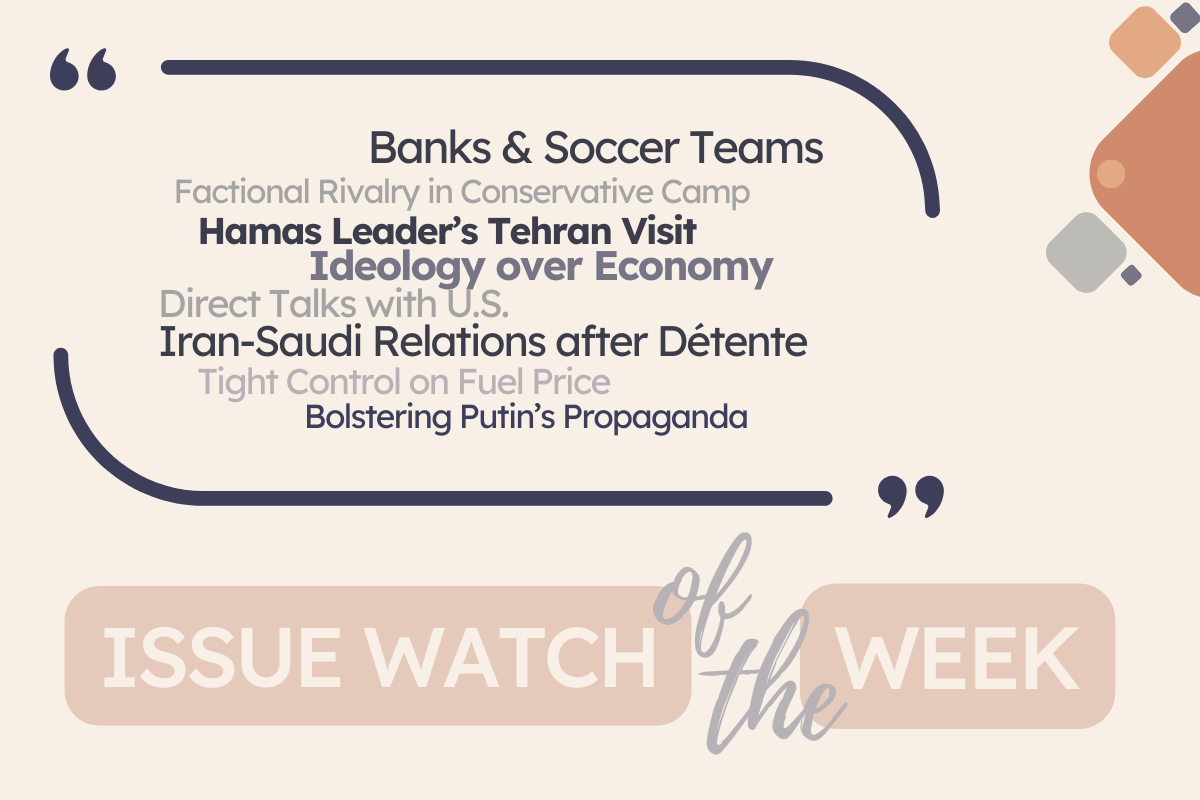Nuclear Stance Rattling International Community:
Rafael Grossi of the International Atomic Energy Agency hopes to make headway on halting Iran’s march to nuclear status when he visits Tehran soon, but he has a sense of urgency about it. He says Iran is weeks, not months, away from having sufficient enriched uranium to develop a bomb, although that does not mean, he adds, that Iran would have a nuclear weapon in that timeframe. Nonetheless, outgoing MP Javad Karimi-Qoddusi, a Paydari Front hardliner, has already caused an uproar with his shorter timeframe: he says Iran could test a bomb in one week. Aside from the anticipated alarm among moderates, even supporters of the hardline Ra’isi administration are showing displeasure at the MP’s ill-considered remarks. One commentator believes this may not be as uncoordinated as it seems and that it is, in fact, an effort to alarm the international community, particularly the U.S., into returning to the negotiating table before the Joe Biden-Donald Trump contest for the presidency in November.
Qalibaf under Pressure:
The only branch of government not headed by a cleric is the Majles, but that could change with challenges to Speaker Mohammad-Baqer Qalibaf coming from ultra-hardline opponents. Four clerics who could snatch the gavel are Hamid Rasa’i, Morteza Aqatehrani, Mahmud Nabavian (Tehran’s top vote-getter) and Mojtaba Zolnur, all with Paydari Front connections. The only lay challenger is former foreign minister Manuchehr Mottaki. A reformist journalist posits a theory that Qalibaf is reaping the whirlwind—loss of stature—by sowing the wind of low voter turnout, or, rather, not pushing for high voter turnout in a truly competitive election. This ensured that such unpopular hardliners as Nabavian and Rasa’i outpolled him and could potentially unseat him. Conservative politician Hosein Kan’ani-Moqaddam faults Qalibaf for overstepping his authority as “hall monitor” to intervene and prevent lawmakers from exercising oversight on the Ra’isi administration’s performance.
Iran’s Hardliners Use Minority Support to Maintain Power:
Hardliners in power claim that their policies, such as hijab enforcement and designating Thursday rather than Saturday as part of the weekend holiday, align with the demands of the people and the marja’s. To them, however, the term “people” represents not the broader public but themselves and their supporters. This echoes tactics common to authoritarian systems that secure the loyalty of a controlled minority through wealth and rentier opportunities, while viewing the general public as adversaries to be repressed and impoverished. Sociologists note that following the widespread protests of 2022, Iranian society has envisioned a different future for which it continues to fight. The establishment, however, is adamant about maintaining its grip on power, using crackdowns to demonstrate to society that civil protests and social movements notwithstanding, things will not change. Essentially, the ongoing civil war-like situation in Iran over issues like hijab underscores the Nezam’s efforts for survival amidst increasing demands for change, rather than being about religious edicts or the purported demands of a loyal minority.
Arab Influence in Caucasus Stirs Worry in Tehran:
Saudi Arabia is actively seeking to mediate the territorial conflict between Armenia and the Republic of Azerbaijan, aiming to establish itself as a key player in regional relations. Riyadh is emphasizing the economic aspects of its burgeoning relationship with Yerevan, viewing Armenia as a strategic hub for expanding its investments. This development raises concerns about Riyadh emerging as a competitor to Iran in the Caucasus, especially as the United Arab Emirates strengthens its ties with the Republic of Azerbaijan, further increasing Tehran’s anxiety about its regional influence. Although Riyadh has not yet normalized relations with Israel, both Baku and Abu Dhabi maintain deep connections with Tel Aviv. This forms a sort of triangle that could marginalize Iran, intensifying regional competition and diminishing its influence.
Isfahan Attack Exposes Defense Vulnerabilities:
Iranian authorities have asserted that their air defense system remained intact after intercepting several mini-drones in Isfahan on 19 April. While officials ridicule the use of quadcopters in such attacks, observers argue that the real concern from this unsuccessful engagement is the deep penetration into Iranian soil, which warrants serious scrutiny. If the official narrative about the type of mini-drones used is accurate, it indicates a breach within a few meters of the target, suggesting that the operators were within Iranian territory, close enough to prepare and launch the drones. Meanwhile, reports of explosions heard in Tabriz, coinciding with the Isfahan attacks, remain perplexing, with officials attributing them only to the sounds of the air defense system.
FOREX and ‘Plunder’ of Iranian Economy:
The Iranian government seems to lack the will or ability to intervene in the currency market, whose fluctuations are wreaking havoc with the country’s middle class. A politically conservative economist attributes the problem to a small coterie of unnamed individuals using the FOREX situation as an opportunity for—to use his term—plunder. He accuses the Central Bank of Iran and the ministry of economy of complicity by inaction, with the value of the dollar having jumped nearly fourfold over the last three years as the Ra’isi administration looks on helplessly, with no authority to intervene. He believes the deliberate impoverishment of Iranians is intended to keep them so enervated by their economic woes that they cannot challenge the system. Minister of Economy Ehsan Khanduzi denies any gains for the administration from the situation; if true, that means the administration takes all the blame without having anything to show for it.
Khamenei Aide: Missteps in Hijab Enforcement:
In what appears to be an effort to distance Ali Khamenei from controversy, an influential member of his staff has tweeted a reaffirmation of the supreme leader’s stance on hijab enforcement, but with a caveat. Stressing Khamenei’s insistence on hijab as both a legal and a religious obligation, Mahdi Faza’eli condemns its haphazard enforcement, which he says has earned some officials a reprimand from the supreme leader. Hijab enforcement has never been more contentious, drawing increasing criticism at various levels of the ruling establishment and within the religious community. The chaotic and arbitrary nature of enforcement may not be intentional, but there is a clear effort to dissociate Khamenei and the Judiciary from its violent aspects.
Nihilism: Prevalent Trend in Iran’s Collective Psyche:
Yet another prominent sociologist is expressing worry about where Iranian society is headed. In an interview with Sharq, Maqsud Farasatkhah outlines his 30 years of research, which has convinced him that hopelessness among Iranians is on an upward trajectory. Iran’s ranking in the global happiness index among 100 countries dropped from 54th in 2000 to 70th in 2023. Farasatkhah also points with alarm to Gallup’s Negative Emotional Experience Report, which places Iran among five of the lowest-ranked countries, along with Sierra Leone, Nigeria, and Iraq. Iran’s sociopolitical system, he argues, is producing despair instead of hope. This, in turn, has led to the collective growth of despair and a destructive nihilism and passivity entirely uncharacteristic of Iranian society.
Administration under Pressure over Blue-Collar Wages:
An unlikely coalition of worker representatives, MPs sympathetic to worker interests and civil society institutions and individuals is putting pressure on the Ra’isi administration to raise the minimum blue-collar wage and bring it more closely in line with inflation. As some lawmakers have acknowledged, the rising price of crude oil is bringing in higher revenues and, therefore, making it possible for the administration to give the workers more—something it had been reluctant to do. These days everyone’s livelihood is tied to the falling value of the national currency vis-à-vis the U.S. dollar, which at one point hit the 70,000-tuman mark. By way of comparison, when the so-called revolutionary Eleventh Majles took over in 2020, the dollar traded at 18,000 tumans on the open market. The Ra’isi administration is displeased with the pressure, making an improbable connection between the sweet “victory” of Operation True Promise and the potential “bitterness” of having to be economically answerable.
Ra’isi’s Future Tied to Economy, Sanctions:
The era of two-term presidencies in Iran could be over. As Ebrahim Ra’isi enters his third year, considerable pressure is mounting from various quarters for a cabinet shakeup, with critics taking direct aim at ministers and the head of the Plan and Budget Organization (PBO). The administration is resisting. Minister of Economy Ehsan Khanduzi and PBO chief Davud Manzur held a joint press conference to paint an optimistic picture of Iran’s economy and explain their plans. Conservative economist Kamran Nadri, who teaches at Khanduzi’s alma mater, Imam Sadeq University, was not impressed. “If Khanduzi wants to solve Iran’s economic problems,” he remarked, “his reports must be realistic.” Projected plans for growth or lower inflation, he said, were unrealistic while sanctions were in place, and barring new trade relations with the world, none of these economic problems would be solved.

